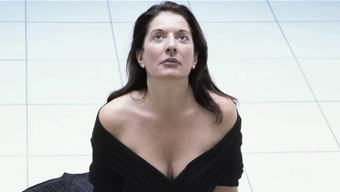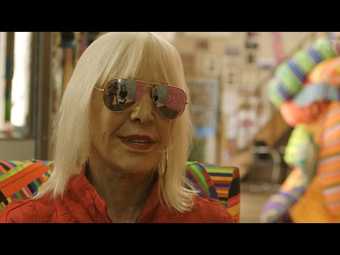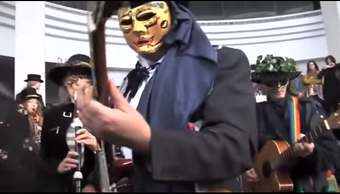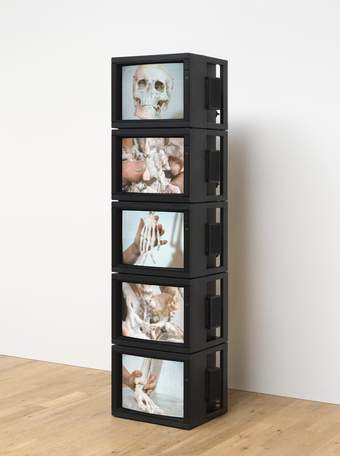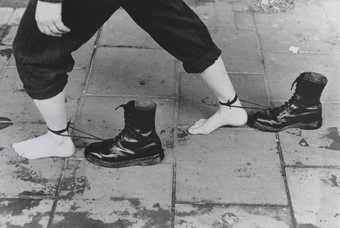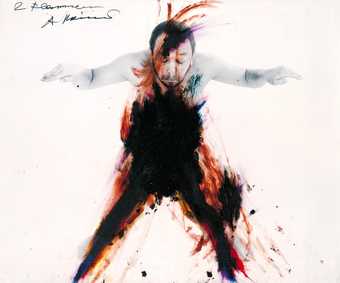TateShots’s army of Twitter friends sent in questions for uncompromising performance artist Marina Abramović. We catch up with her while she’s in the UK preparing for a residency at the Manchester International Festival, where she will present performances by some of her favourite artists.
Tateshots is in Manchester, to put your questions to performance artist Marina Abramovic. We are at the Whitworth Gallery, where Marina is presenting 17 days’ worth of nonstop performance art.
Interviewer: Okay Marina, so if you could take a card.
Marina: Let me close my eyes. Let’s feel everything. It could be this one first. Okay. ‘Is it possible to understand your art without seeing, performing live?’ I think it’s only partially possible, because if you see the… not photographs much, but for me the video, you can get the sense of the performance, but you never really can have the full experience, because the life energy is missing, it’s missing some kind of direct contact you establish with the public, and not any kind of media, not photograph, and not the video or film can catch it. So you have to be there. [Picks another card] Okay, let me see this one. ‘Is performance still a critical tool in the era of performative work?’ You know, performance is never dying, actually, as a form of art. Every time there is a crisis, you know, political, economical, somehow performers appear. The performance is a phoenix.
Interviewer: What do you think of the word ‘performative’?
Marina: You know, performative means that the public can take a kind of active role in viewing the piece, not just as an observer, but also to actually act and be in the piece. But this posed lots of questions, because there are so many rules. Every museum, every gallery have a rule how to interact, what is possible, what is not possible, so that really performative work doesn’t really work, because the public doesn’t know how to deal with that. [Takes another card] Ah, let’s see this one! ‘How does it feel to have your work imitated on Sex and the City?’ Ah! You know, it is the first time that the woman who sold me vegetables for 20 years of my life in Amsterdam had a big smile on her face and say, ‘Good morning, Ms Abramovic, do you like fresh strawberries today?’ I mean, she never talked to me before. So somehow it looks like by being on Sex and the City I must be accepted by the mass culture, and you know, what is the purpose of Art – it is to be accepted. But is this at any cost? There, I didn’t perform. Somebody else performed my role in the performance, but I think that it is better to see this during my lifetime than when I’m dead, and happen anyway. [Picks another card] God, that must be every question.
Interviewer: Yes, this is good.
Marina: ‘How far is too far?’ Ah! That’s an interesting question. So, I can only answer it with another question, and this is – I’m going to look not to you, but to the camera – who creates limits? [Takes another card] Okay, this one. ‘Where, or how, did you find the courage and confidence to start doing what you do?’ Maybe the fact that my both mother and father are national heroes is something to do with it, I don’t know! But definitely I was grown up with this iron discipline and something to being Slavic and thinking about legend, and thinking about you sacrifice yourself for the art and for the cause, it was the very important thing about it. I think it’s not about courage, it’s more about discipline.
Interviewer: Only two left.
Marina: ‘In Expanding Space, why did Ulay leave, and you carry on?’
Interviewer: You’d better explain the work, just in case…
Marina: All right. So this is the work, it is made in 1977 for the Dokumentar in Germany, and it was done in an underground garage where we built two columns… Why exactly are the lights change? Technician voice: Do you mind stopping for a moment? Interviewer: Yeah, Marina: Can you turn to see how much light is this, can you turn me there the little screen to me? [Screen turned] It’s perfect now, you see. It’s dark, and we can speak in the dark. And it’s a very dramatic light, and I think we should continue without stopping. And you see the moments of errors are very important parts of performance. I think we should definitely continue.
Interviewer: So last question then, before Kate gets back.
Marina: So, ‘Due to the ephemeral nature of your work, what if any are your plans for preserving it?’ You see, a human being really wants to preserve his ideas and his work, it is the only thing that can live after he dies. So for me it’s not really preserving my own work, it’s more preserving the idea of performance, who have to live through the younger generation of artists.
Interviewer: Well done. Got through all of them.
Marina: Before the light stops, we had this question
Interviewer: Oh, that’s right, yeah, we need to do that. The question was, in Expanding Space…
Marina: Why I left first?
Interviewer: Yeah.
Marina: So, the story is very simple, because we made these columns were double size of and double weight of our bodies, and we pushed them with our body, you know, we expanded space. It’s a very architectural piece, it’s very minimalist, two naked bodies pushing two columns. And the performance was voice synchronized, but in one point Ulay’s column didn’t move any more, and as he didn’t move, he didn’t see the reason any more of pushing, so he left. But somehow because of so much people in audience – for first time we had more 1,500 people – looking at – I got in some type of trance, I didn’t even notice my column didn’t move, so I was continuously pushing, pushing, pushing.
Interviewer: Was that quite tough on you and your body, though, when you…?
Marina: But you don’t think that moment, only afterwards, when you are completely dark blue and you can’t sleep on your stomach but on your back for three months, that’s another thing, plus the breasts, because you’re not pushing by hands, you’re pushing by all body and moving, touching. And now we are going to get light, but our interview is finished!

